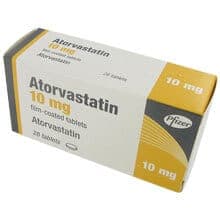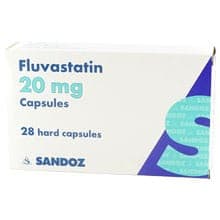Login to your account
- Prescription included
- Genuine medication
- All-inclusive service - No hidden fees
- Free next-day delivery
High Cholesterol
Get high cholesterol medication with an online prescription
6 out of every 10 people in the UK currently have high cholesterol of which a large majority are not aware of their condition. However, if left untreated, high cholesterol can increase your risk of cardiovascular problems like heart disease and strokes.
High cholesterol can be managed by making dietary and lifestyle changes; however some cases will also require medication. The medications most commonly used to treat high cholesterol are statins. Lipostat, Pravastatin and Simvastatin are just a few of the medications that are available at euroClinix to treat high cholesterol.
Available Treatment(s)
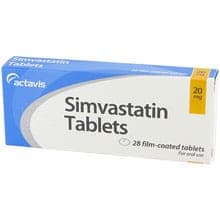
- Lowers bad cholesterol levels
- Clinically proven to reduce risk of heart disease
- Generic version of Zocor
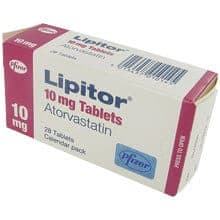
- Contains the active ingredient Atorvastatin
- Effectively reduces cholesterol levels
- Clinically proven to lower risk of heart disease
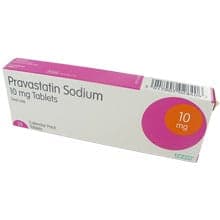
- Helps improve cholesterol levels
- Effective treatment for high cholesterol
- Easy-to-take tablets
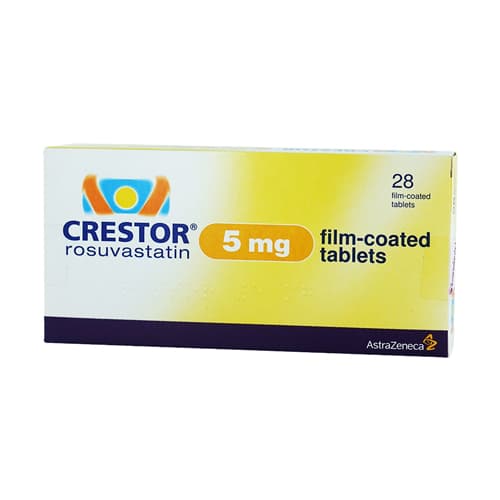
- Effective cholesterol management
- Powerful heart protection
- Convenient daily dosing
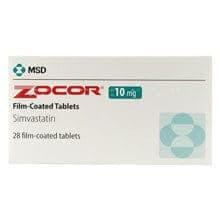
- Limits the risk of cardiovascular problems
- Increases HDL 'good' cholesterol
- Branded version of the generic medication Simvastatin
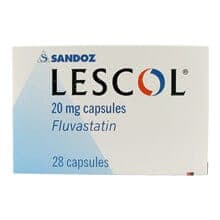
- Lowers cholesterol levels
- Reduces the chance of cardiovascular complications
- Branded treatment of the generic medication Fluvastatin
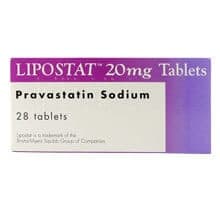
- Lowers cholesterol levels
- Reduces the risk of angina, heart attack and stroke
- Branded treatment of the generic medication Pravastatin
What is high cholesterol?
Cholesterol is a fatty substance that can be found in the bloodstream. It is a sterol, a type of lipid (fat) that is found in the cells throughout your body. It is a vital substance in your body, as it facilitates the production of hormones, vitamin D and other substances crucial for digestion. About 80% of the cholesterol in our bodies is produced by our liver, the rest comes from the food we eat. Cholesterol is carried in your bloodstream by different proteins. When the cholesterol and proteins combine, they become a single substance known as lipoproteins.
People often refer to two main types of cholesterol, ‘good’ and ‘bad’ cholesterol. However, when discussing ‘good’ or ‘bad’ cholesterol, they usually mean the specific types of lipoproteins and how they affect your cardiovascular system.
LDL Cholesterol
Low density lipoproteins (LDL), or LDL cholesterol, are the ‘bad cholesterol’. They are responsible for transporting cholesterol to cells when it is needed, however, high levels of LDL mean there is an excess of cholesterol that isn’t needed. This means that the excess cholesterol is deposited in the artery walls, a condition known as atherosclerosis. Over time, this causes cholesterol to gradually build up. This blocks blood vessels and limits blood flow. The heart therefore has to work harder to push blood around the body, leading to serious complications as your organs aren’t getting the oxygen and nutrient supply they need.
HDL Cholesterol
High density lipoproteins (HDL), also known as HDL cholesterol, are necessary to transport cholesterol away from cells to return to the liver to be removed. This is why this type of protein is known as ‘good’ cholesterol, as this prevents cholesterol buildup in the arteries.
VLDL and IDL Cholesterol
Very low-density lipoproteins (VLDL) and intermediate-density lipoproteins (IDL) also play a role in causing atherosclerosis. They are responsible for transporting some cholesterol in the body, as well as triglycerides. Triglycerides are another type of lipids that contain fats and sugar. They are one of the body’s main sources of energy but, much like LDL cholesterol, too much of it can result in fat buildup in the arteries. High triglyceride levels are similarly caused by an unhealthy lifestyle and can occur separately from or in conjunction with high cholesterol.
Having high cholesterol is something that is not noticeable from the outside or even by the way a person feels. This is why it is important for you to get regular health checks if you are at risk, so it can be treated quickly and before it can get serious.
What are the causes of high cholesterol?
High cholesterol levels are generally caused by poor lifestyle habits, including a diet high in saturated and trans fats alongside little exercise. Obesity is another cause of high cholesterol, particularly in those whose fat builds up around their stomach as this means more fatty acids are being transported to the liver.
Other causes and risk factors for high cholesterol include:
- your age - men over 50 and women post-menopause are more at risk of higher total cholesterol levels
- a genetic condition familial hypercholesterolaemia (FH) which leads to very high cholesterol levels
- an underactive thyroid gland (hypothyroidism) - as thyroid glands help to remove excess LDL cholesterol
- type 2 diabetes
- smoking
- a family history of cardiovascular issues
- kidney or liver issues
- your ethnic background
Some of these risk factors are out of your control, that’s why it’s important to manage the factors you can control such as your weight, diet and exercise.
What are the complications of high cholesterol?
As there are no physical symptoms of having high cholesterol, it’s important you have regular check ups for your cholesterol levels, especially if you are more at risk. This is because having undiagnosed high blood cholesterol for prolonged periods of time can cause damage to your circulatory system including conditions such as:
- high blood pressure - caused by the heart having to strain to pump blood around the body due to narrowed arteries
- carotid artery disease - damage to the inner layers of the carotid arteries, that cyclically cause more cholesterol buildup as they heal
- coronary heart disease / ischaemic heart disease - when arteries become partially blocked by cholesterol buildup
- arrhythmia (irregular heartbeat)
- peripheral artery disease (PAD) - where plaque build up prevents blood flow to your extremities
- long-term heart failure - when your heart can’t fill up with blood or is too weak to pump blood around the body
- angina (chest pain)
- non-alcoholic fatty liver disease (NAFLD) - build up of excess fat in the liver
A lot of these conditions have little to no symptoms and are only noticed when the complications are more serious. In fact, 1 in 4 circulatory and heart disease-related deaths are caused by high LDL levels. More serious complications include:
- strokes - when blood flow to the brain is blocked
- cardiogenic shock - when the heart cannot pump enough blood to vital organs
- heart attacks - where blood flow to the heart is completely blocked by the rupturing of cholesterol buildup in the artery, which can cause scar tissue to build up on the heart over time
- sudden cardiac arrest - where the heart stops beating unexpectedly fibrosis and cirrhosis - severe inflammation of the liver
The risks of high cholesterol are serious, but are still preventable in most cases. It’s never too late to start improving your heart health.
How do you diagnose high cholesterol?
High cholesterol has no obvious symptoms until it is too late. The only way to know is to have a cholesterol test. This usually consists of a blood test, involving either a finger-prick test or a blood sample being taken through a syringe.
A healthy total cholesterol level should be below 5 mmol/L, your LDL levels (bad cholesterol) should be below 3 mmol/L whilst your HDL (good cholesterol) should be above 1.0 mmol/L for men and 1.2 mmol/L for women. This is a service your GP or pharmacist will recommend, especially if you are more at risk. They will also check for triglyceride levels. They will discuss your results with you and treatment options if they find your total and LDL cholesterol levels are too high.
It’s also important for you to continue having your cholesterol tested throughout your life, even if you are already on treatment, to make sure the medication is working correctly for you.
How do you treat high cholesterol?
Lifestyle changes
The most common way to get lower LDL levels is through lifestyle changes. Usually this will involve increasing your physical activity and altering your diet.
The main change in your diet will be the kinds of fats you eat. Foods that are high in saturated and trans fats such as cakes, fatty meats, coconut oil and full-fat dairy products will all raise your LDL cholesterol levels. Substituting these fats for healthier, non-saturated fats is the best way to still get all the nutrients we need from fat whilst keeping your cholesterol low, such as fish and vegetable oils. There are other cholesterol-lowering foods such as whole grains and soy that not only decrease LDL levels, but also increase your levels of HDL.
Exercise will also help lower your cholesterol. The NHS recommends doing 150 minutes a week of moderate physical activity such as brisk walking, dancing or cycling. Alternatively, you could do 75 minutes of vigorous physical activity such as running, swimming or sports. Both a healthy diet and exercise will also help you lose weight. Being a healthy weight will also help to keep your heart healthy and reduce your risk of other obesity-related complications.
Need help losing weight?
Find out more hereQuitting smoking will also significantly reduce your risk of high cholesterol. This is because the tar from smoking builds up in your arteries, and means cholesterol can more easily bind to the artery walls.
Want to quit smoking?
Find out more herePrescription medications
However, if your levels of cholesterol are too high or cannot be managed through lifestyle changes alone, then your doctor may prescribe a medication to help lower your cholesterol. The treatment chosen will depend on the LDL, HDL and triglyceride levels in your blood and whether these levels will put you at a high risk of developing related health problems such as heart disease or stroke.
The most commonly prescribed treatment against high cholesterol is a group of medication called statins. They work by blocking enzymes in your liver responsible for producing cholesterol. They may be prescribed to you if you are at a high risk of developing cardiovascular disease as a result of high cholesterol, even if you are otherwise healthy. You may also be prescribed statins if you've already experienced cholesterol-related complications.
There are various different types of statins and they are all available in generic and branded versions. The below statins all work in a similar way to help you better control your cholesterol:
- Simvastatin (Zocor)
- Atorvastatin (Lipitor)
- Rosuvastatin (Crestor)
- Fluvastatin (Lescol)
- Pravastatin (Lipostat)
One type of statin may be more suitable for you than another, which means that your doctor may recommend an alternative statin if you experience side effects from taking one.

How do I buy treatment for high cholesterol online?
You can buy various statins here euroClinix for the treatment of high cholesterol, including Simvastatin, Atorvastatin, Crestor and many others. All you have to do is fill out an online consultation form which will be reviewed by one of our registered doctors. Once they find that you are suitable for treatment, your medication will be dispensed and dispatched by our pharmacy with free next-day delivery.
Further reading

The 10 best cholesterol-lowering foods
Reviewed by Dr. Caroline Fontana
Understanding and managing the side effects of statins
Reviewed by Dr. Caroline FontanaSelect
medicationFill out a short
medical formDoctor issues
prescriptionMedication sent
from pharmacy

